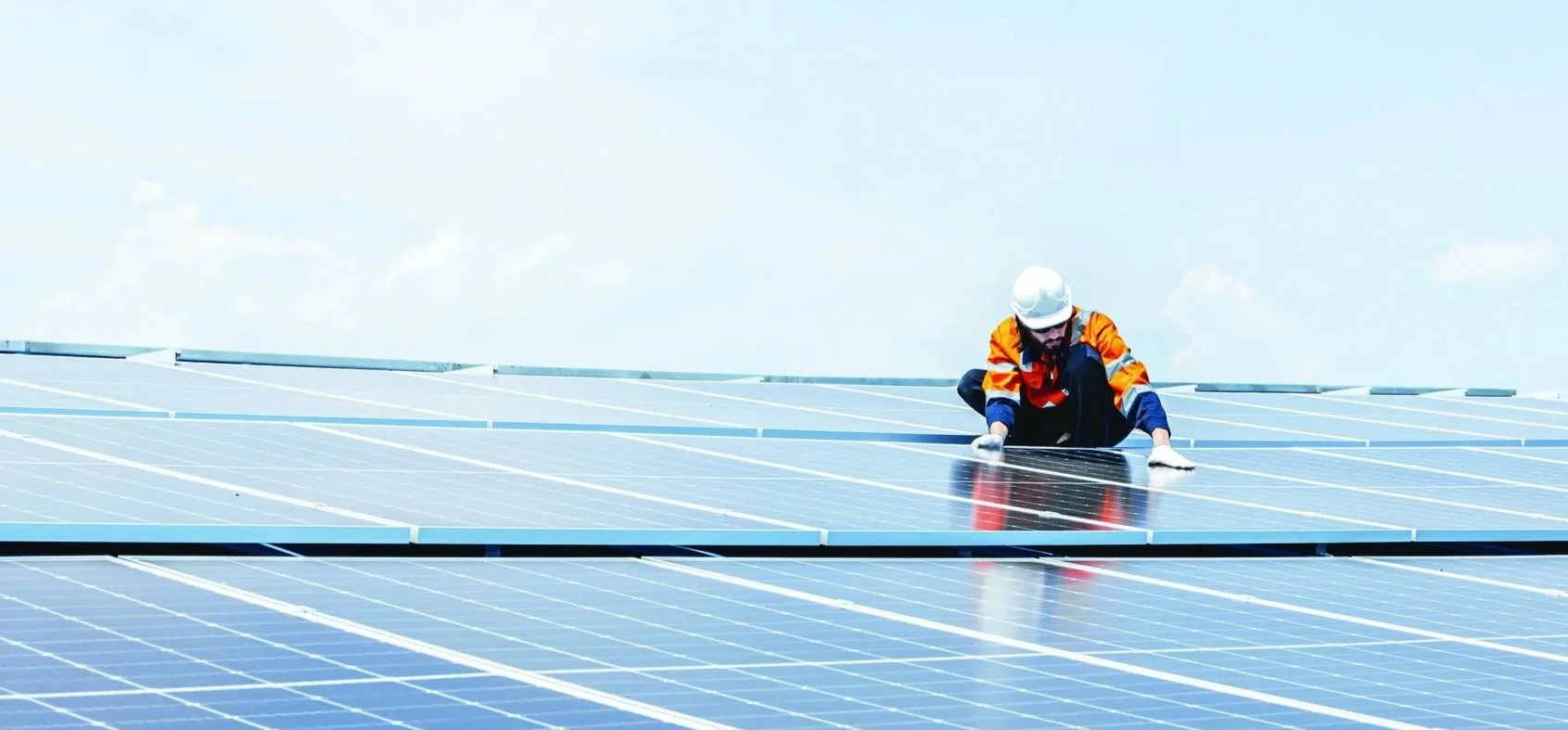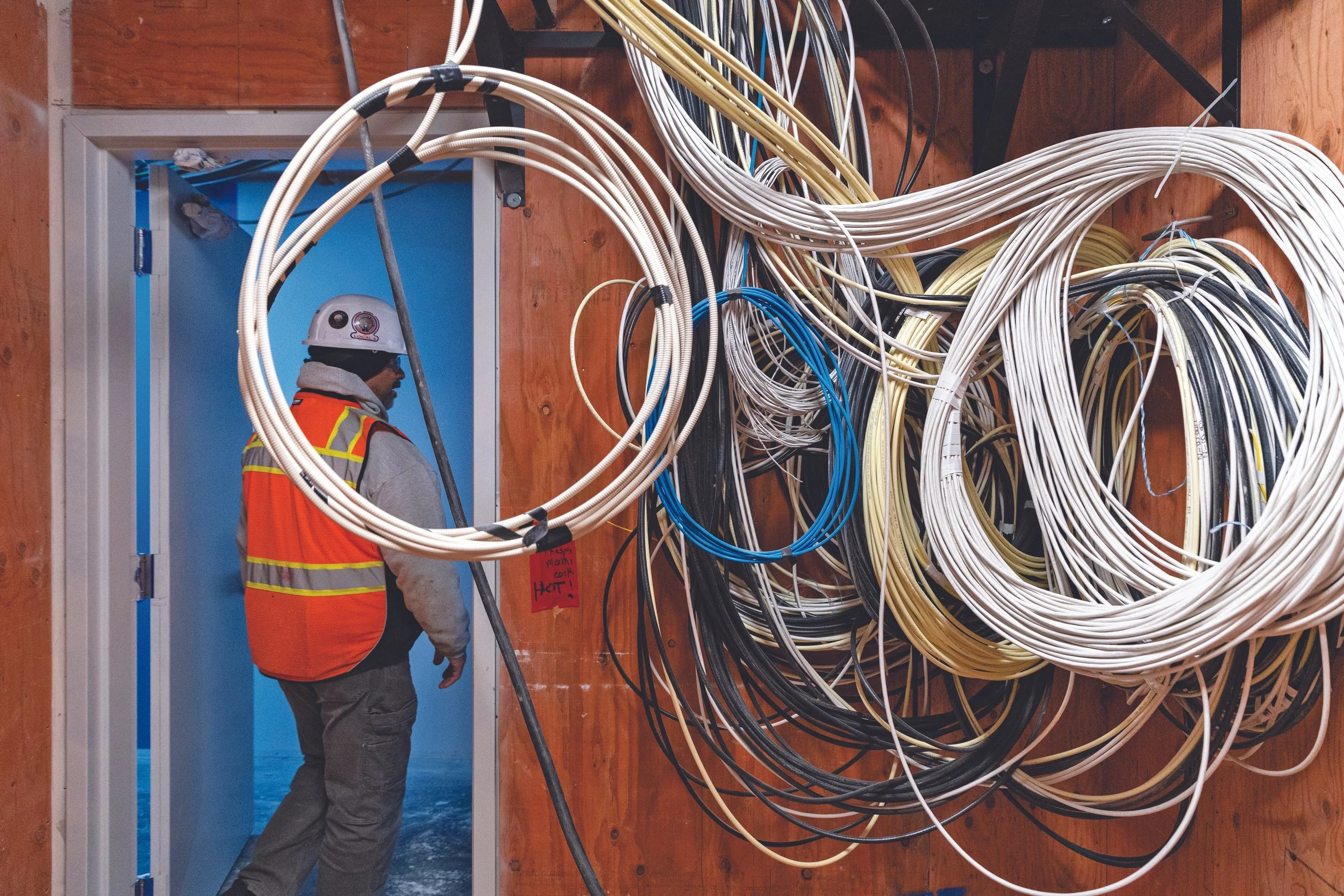A Big, Ugly Punch in the Gut
The Republican-passed, Trump-designed ‘Big, Beautiful Bill’ Cuts Funding for Infrastructure Projects, Putting Livelihoods at Risk
Photo credit: Korn Vitthayanukarun via Vecteezy
In July, congressional Republicans passed and President Donald Trump signed the so-called One Big, Beautiful Bill Act. While the legislation has drawn criticism on multiple fronts — from its devastating Medicaid cuts to its generous tax breaks for the wealthiest Americans — it is the rollback of incentives established under former president Joe Biden’s Inflation Reduction Act (IRA) and related policies that will hit the building trades hardest, particularly in the electrical field.
“The consequence is that it’s going to result in less work for union electricians in the renewable energy sector,” said Alex Lantsberg, research and advocacy director for the San Francisco Electrical Construction Industry. “I think we’re already seeing that.”
The Gut Punch
Gretchen Newsom, international representative for government affairs with IBEW’s Ninth District, didn’t mince words when discussing the bill, which she prefers to call the Big, Ugly Bill. She warned that the legislation would have a destabilizing effect.
“This has sent shockwaves throughout the renewable energy sector that IBEW […] and many other crafts work in, and it slashes tax credits that are essential for solar and wind projects that are putting our members to work,” Newsom said.
The Trump administration is pulling hundreds of millions of dollars in incentives for California’s solar and wind programs. Developers were counting on those funds to make their projects financially viable. Now, many must either secure other funding sources or cut their losses and walk away.
Tens of thousands of well-paying union jobs could disappear with the stroke of a pen.
“Less public renewable energy work is less union work, in the sense that we have a significant share of that market,” Lantsberg said. “A lot of that work, especially in the Bay Area, ends up being done by union signatory contractors and union electricians.”
Certain deadlines exist for various types of work — an off-ramp, if you will — provided by the administration. Tax credits for solar and wind projects will continue only if a project is either under construction by July 2026 or operational by the end of 2027.
“There’s a chance that what we’re going to be seeing right now is a big push to get workers to build this stuff as fast as possible so that they can take advantage of the IRA rebates that exist,” Lantsberg said.
But even then, Trump has issued an executive order that creates even more uncertainty by calling into question the definition of terms such as “under construction.”
IBEW Local 6 Business Manager and SF Building Trades Council Vice-President John Doherty pointed to the Port of San Francisco as a striking example of the ripple effects. The port needs major rehabilitation to prepare for subsidized offshore-wind projects — work that won’t happen without those funds. That means not just the loss of electrical worker jobs, but also the loss of work for laborers, plumbers, pile drivers, and more building trades members.
“By canceling all of this future investment in offshore wind, not only are we not going to see that money coming in to restore parts of the port, we’re not going to see the money that subsequently gets invested in the on-shore production for offshore wind,” Doherty said.
Wires hang from the ceiling of a project under construction at 730 Stanyan Street in San Francisco in March while an IBEW Local 6 member is seen in the background. | Photo credit: Jana Ašenbrennerová
The Uncertain Future of Apprenticeships
Doherty said that the pain from the cuts won’t be confined to union halls but that it’ll ripple into apprenticeship programs as well. The industry had counted on these projects to provide work opportunities for apprentices and, once they turned out, stable, well-paying jobs. Federal subsidies would not only have supported project development, but also the work hours apprentices need to progress through their training.
“Apprenticeship booms when construction is going, but when construction slows down, so does the intake of apprentices,” Doherty said. “Cutting projects off that are already in the pipeline, and everything else — you’re cutting off futures right then and there.”
Gretchen Newsom agreed, noting that while the IBEW will work hard to keep apprentices employed, the task will be significantly more challenging than before.
“For those unions and locals that had admitted more apprentices over the recent years because they saw all the good news that was coming from the Biden administration and all the new jobs that were coming in — all the infrastructure work — that’s now up in the air,” she said.
What Next?
Apprenticeships aren’t the only thing up in the air, as many other unknowns remain.
Lantsberg wonders, for instance, how the rapid expansion of AI data centers, which are enormous consumers of electricity, will proceed without parallel investment in energy-sector development.
He predicts that the electrical industry will soon be chasing work, pivoting to public-works projects and affordable housing construction, and securing project labor agreements.
“I’m definitely not an optimist when it comes to this,” Lantsberg said.
Doherty called the cuts a lost opportunity and said that Local 6 will shift resources to wherever work can be found. He’s particularly frustrated with the lack of movement on stalled SF mega-developments such as Schlage Lock and Candlestick.
“We just redouble our efforts to get anything that we’ve got an agreement on to try and get it moving as fast as possible,” Doherty said. “They’re not building because they can’t do it as cheaply as they want — to make as much money as they want, I guess.”
Both Lantsberg and Newsom predicted a sharp uptick in organizing efforts, labor disputes, and broader fights ahead for the labor movement.
Newsom said that the IBEW is already educating members on what the Big, Ugly Bill means for them, circulating a two-page flier that spells out its negative impacts. Among the ironies she notes is that union dues still can’t be deducted, but the purchase of private jets can.
“We’ll continue to advocate for policies that support renewable energy development, protect union jobs, and ensure affordable energy for families,” Newsom said.


